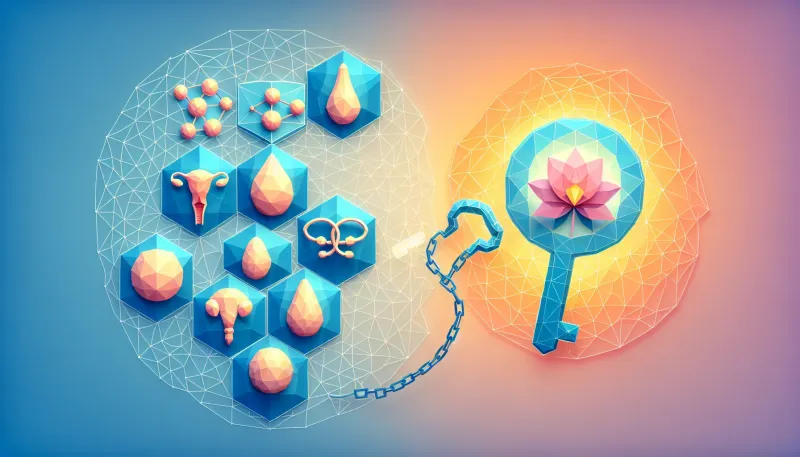Unlocking the Connection Between Hormonal Balance and Fertility: Essential Insights

Discover the intricate connection between hormonal balance and fertility. This comprehensive guide provides essential insights and solutions for those seeking to understand or improve their fertility.
Understanding the link between hormonal balance and fertility is crucial for anyone looking to conceive. Hormones play a key role in regulating the reproductive system, and any imbalance can significantly impact fertility. This article delves into the intricate relationship between hormones and fertility, offering invaluable insights and practical solutions.
The Role of Hormones in Fertility
Hormones are chemical messengers that regulate various functions in the body, including reproductive processes. Key hormones involved in fertility include:
- Follicle-Stimulating Hormone (FSH): Stimulates the growth of ovarian follicles in women and sperm production in men.
- Luteinizing Hormone (LH): Triggers ovulation in women and stimulates testosterone production in men.
- Estrogen: Prepares the uterine lining for implantation and regulates the menstrual cycle.
- Progesterone: Supports pregnancy by maintaining the uterine lining.
- Testosterone: Essential for sperm production and male libido.
Common Hormonal Imbalances Affecting Fertility
Several hormonal imbalances can hinder fertility. Some common conditions include:
Polycystic Ovary Syndrome (PCOS)
PCOS is characterized by irregular menstrual cycles, high levels of androgens (male hormones), and polycystic ovaries. Symptoms may include weight gain, acne, and hirsutism. This condition can affect ovulation and thereby fertility.
Thyroid Disorders
Both hyperthyroidism (overactive thyroid) and hypothyroidism (underactive thyroid) can disrupt menstrual cycles and ovulation. Thyroid hormones are essential for reproductive health.
Hyperprolactinemia
Elevated prolactin levels can inhibit FSH and LH, preventing ovulation and causing irregular menstrual cycles. This condition may be due to a pituitary gland disorder or medications.
Low Testosterone in Men
Low testosterone levels can lead to decreased sperm production and impaired fertility. This condition can be caused by genetic disorders, obesity, or lifestyle factors.
Diagnosing Hormonal Imbalances
Diagnosing hormonal imbalances involves several steps, including a thorough medical history, physical examination, and blood tests to measure hormone levels. Common tests include:
- Blood Tests: To assess levels of FSH, LH, estrogen, progesterone, testosterone, and thyroid hormones.
- Ultrasound: To examine the ovaries and uterus for abnormalities such as cysts or fibroids.
- Saliva Tests: To measure hormonal fluctuations throughout the menstrual cycle.
Restoring Hormonal Balance to Improve Fertility
Once a hormonal imbalance is diagnosed, several strategies can help restore balance and improve fertility:
Lifestyle Modifications
Simple lifestyle changes can have a profound impact on hormonal balance. These include:
- Maintaining a Healthy Weight: Obesity and being underweight can both affect hormone levels and fertility.
- Regular Exercise: Moderate physical activity can help regulate hormones and improve overall health.
- Balanced Diet: Consuming a diet rich in whole foods, lean proteins, healthy fats, and complex carbohydrates supports hormonal health.
- Stress Management: Practices such as yoga, meditation, and mindfulness can reduce stress and balance cortisol levels.
Medical Treatments
Depending on the underlying cause of the hormonal imbalance, medical treatments may include:
- Medications: Clomiphene citrate, metformin, and hormone replacement therapies can regulate menstrual cycles and support ovulation.
- Surgery: In cases of structural abnormalities such as fibroids or blocked fallopian tubes, surgical intervention may be necessary.
- Assisted Reproductive Technologies (ART): Techniques like in vitro fertilization (IVF) and intrauterine insemination (IUI) can aid in conception.
Alternative Therapies
Some couples may explore alternative therapies to complement conventional treatments:
- Acupuncture: Can enhance blood flow to the reproductive organs and balance hormones.
- Herbal Supplements: Certain herbs such as vitex and maca are believed to support hormonal balance.
When to Seek Professional Help
If you have been trying to conceive for over a year (or six months if you are over 35), it is advisable to consult a fertility specialist. Timely intervention can help identify and treat hormonal imbalances or other underlying issues affecting fertility.
Conclusion
Understanding the connection between hormonal balance and fertility is essential for anyone facing challenges in conceiving. While hormonal imbalances can significantly hinder fertility, various lifestyle changes, medical treatments, and alternative therapies can help restore balance and improve your chances of conception. If you suspect a hormonal imbalance, seek professional guidance to embark on the right path towards achieving your fertility goals.



























